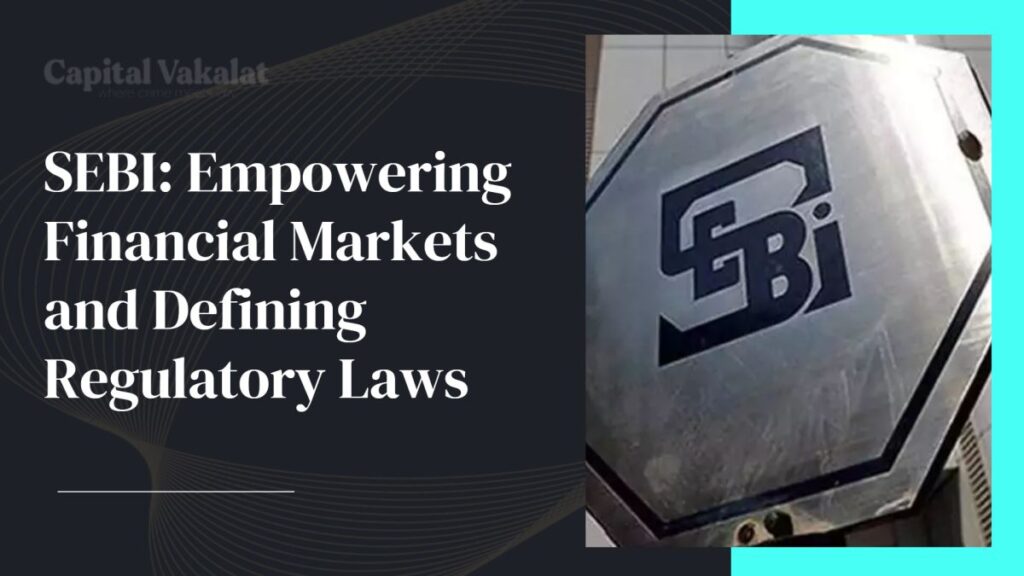In the dynamic landscape of the financial world, the secondary market plays a pivotal role in facilitating the trading of securities after their initial issuance. To ensure transparency, investor protection, and a level playing field, regulatory bodies such as the Securities and Exchange Board of India (SEBI) assume a paramount role.

This article delves into the multifaceted role of SEBI in the secondary market, highlighting its functions, impact on investors, and measures to ensure market integrity.
Role of SEBI in the Secondary Market
In this section, we’ll explore how SEBI actively contributes to the efficient functioning of the secondary market, promoting investor confidence and fostering growth.
Regulating Market Participants
SEBI oversees a wide array of market participants, including stock exchanges, brokers, depositories, and rating agencies. By enforcing stringent regulations and conducting regular audits, SEBI ensures that these entities adhere to fair practices and maintain the highest standards of transparency.
Investor Education and Protection
One of SEBI’s primary objectives is to educate and protect investors. Through comprehensive awareness campaigns and educational initiatives, SEBI empowers investors with knowledge about market dynamics, risks, and best practices. This proactive approach instills confidence among investors and encourages their active participation in the secondary market.
Market Surveillance and Enforcement
SEBI employs cutting-edge technology to monitor market activities and detect any irregularities or manipulative practices. This real-time surveillance helps maintain market integrity and prevents fraudulent activities, safeguarding the interests of both retail and institutional investors.
Ensuring Disclosure and Transparency
Transparency is the bedrock of a healthy secondary market. SEBI mandates companies to disclose accurate and timely information about their financial performance, corporate governance practices, and other material events. This ensures that investors have access to reliable data, enabling them to make informed decisions.
Facilitating Market Innovation
SEBI fosters an environment conducive to innovation by introducing new financial instruments and trading mechanisms. By embracing technological advancements, such as algorithmic trading and blockchain-based settlement systems, SEBI enhances market efficiency and widens the scope of investment opportunities.
Impact of SEBI on Investors
SEBI’s unwavering commitment to investor protection has a profound impact on individual and institutional investors alike.
Empowering Retail Investors
SEBI’s initiatives to enhance investor awareness and simplify investment processes have democratized the secondary market. Retail investors now have access to user-friendly platforms, educational resources, and simplified investment options, leveling the playing field with institutional investors.
Building Investor Trust
The regulatory framework established by SEBI bolsters investor confidence by minimizing risks and ensuring fair practices. This trust attracts both domestic and international investors, fostering a robust investment ecosystem and contributing to economic growth.
Reducing Systemic Risks
SEBI’s vigilant oversight and timely intervention mitigate systemic risks that could otherwise destabilize the financial system. By maintaining a balance between innovation and risk management, SEBI helps create a resilient market environment.
Conclusion
In the intricate web of the secondary market, SEBI emerges as a steadfast guardian, ensuring market integrity, protecting investor interests, and fostering a culture of transparency. Its multifaceted functions empower investors, mitigate risks, and lay the foundation for a thriving investment landscape. As we navigate the complexities of the financial realm, SEBI’s unwavering commitment continues to shape a secondary market that is equitable, efficient, and conducive to sustainable growth.
Here are some external resources related to the role of SEBI in the secondary market that you may find useful for further reading:
- Securities and Exchange Board of India (SEBI): The official website of SEBI provides comprehensive information about its functions, regulations, and initiatives in the Indian securities market.
- SEBI Act, 1992: The full text of the SEBI Act, outlining the legal framework governing SEBI’s role and responsibilities.
- Investopedia – Securities and Exchange Board of India (SEBI): An informative article providing an overview of SEBI’s role, functions, and impact on the Indian securities market.
- Livemint – SEBI: A regulator for markets: A collection of news articles, analyses, and opinion pieces about SEBI’s role in regulating and overseeing the Indian financial markets.
- Economic Times – SEBI: Stay updated with the latest news, developments, and regulatory changes related to SEBI and the Indian securities market.
- National Stock Exchange of India Ltd. (NSE): The official website of NSE, one of the leading stock exchanges in India, offers insights into market trends, data, and trading activities.
- Bombay Stock Exchange (BSE): Explore BSE’s website for information on listings, indices, market data, and investor education.
- Moneycontrol – SEBI: Access financial data, stock prices, and news related to SEBI and other financial entities on Moneycontrol’s platform.
- Invest India – SEBI: Learn about SEBI’s role in promoting investments and business growth in India through this government platform.
- The Hindu BusinessLine – SEBI: Browse through articles, analyses, and opinions on SEBI’s regulatory actions and their impact on the Indian economy.
These external resources offer a deeper understanding of SEBI’s role, its functions, and its impact on the secondary market. Remember to verify the credibility of these sources before citing them in your research or content.
FAQs
What is SEBI’s role in investor protection?
SEBI conducts awareness campaigns, educates investors, and enforces regulations to safeguard investor interests and promote fair practices.
How does SEBI detect market manipulation?
SEBI utilizes advanced technology for real-time surveillance, allowing it to detect and prevent market manipulation and fraudulent activities.
How does SEBI promote market innovation?
SEBI introduces new financial instruments and embraces technological advancements to enhance market efficiency and expand investment opportunities.
How does SEBI empower retail investors?
SEBI simplifies investment processes, provides educational resources, and offers user-friendly platforms to empower retail investors in the secondary market.
What is the impact of SEBI on international investors?
SEBI’s robust regulatory framework and investor protection measures attract international investors, contributing to a vibrant and competitive market ecosystem.